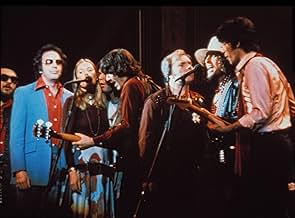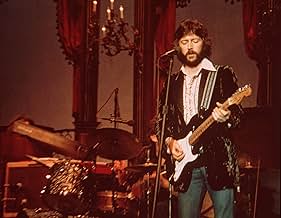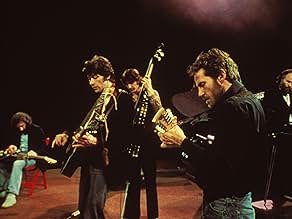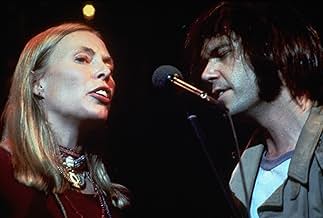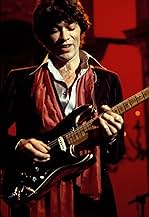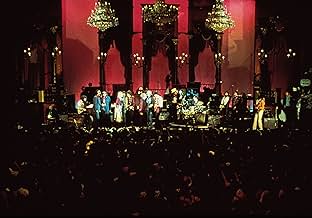IMDb RATING
8.1/10
21K
YOUR RATING
A film account and presentation of the final concert of The Band.A film account and presentation of the final concert of The Band.A film account and presentation of the final concert of The Band.
- Awards
- 3 wins & 3 nominations total
- Director
- Writer
- All cast & crew
- Production, box office & more at IMDbPro
Featured reviews
10LJMTitle
You don't have to be a die-hard fan of The Band to appreciate this concert film. Martin Scorsese turns this farewell performance into a lasting tribute to one of the greatest bands of all time, and to many of their contemporaries as well. The guest performer list for this show reads like a veritable who's who of Rock and Roll history, with performances by Van Morrison, Joni Mitchell, Bob Dylan and Eric Clapton, to name but a few. Even if you weren't born yet, or were too young to remember these artists in their heyday, this film will educate you as to what all the fuss was about. And believe me, the fuss was well deserved.
Forget "Woodstock". Forget "Gimme Shelter". "Let It Be'? Forget that too. This is, truly, THE greatest rock and roll film ever made. Why? Well, try for a moment to forget that the actual performance itself features the great artists it does (including The Band) and focus on the film itself.
This film is shot in 35mm format which gives the picture pristine look (as opposed to all other previous rock films, which were shot on 16mm). But it's not just a spralling work, this is also well executed as well. By that, I mean the production value is outstanding. The lighting is unlike any rock concert I've seen (and I've seen many). The camera work is top-notch (apparently it was done by the best in Hollywood at the time). It's also easy to see that a great deal of planning went into the production. Other concert films (Woodstock, Monterey Pop) suffer from a "last minute scramble" look that simply isn't there with "Waltz".
Add to that the shear magnitude of what The Band had undertaken. Imagine learning, arranging and performing so many songs in so many styles by so many artists in one night with only one take of each allowed. When that is taken into consideration, you have to have a degree of respect for them. Of course, I'm bias. I'm Canadian, as were 4/5ths of The Band.
My only critique would be a technical one. It seems Rick Danko redubbed all of his bass playing. Whether this is attributed to a technical problem or unhappiness with his performance is unclear. However, what is clear is that what you hear the bass doing in the audio and what you see on the screen are completely different.
This film is shot in 35mm format which gives the picture pristine look (as opposed to all other previous rock films, which were shot on 16mm). But it's not just a spralling work, this is also well executed as well. By that, I mean the production value is outstanding. The lighting is unlike any rock concert I've seen (and I've seen many). The camera work is top-notch (apparently it was done by the best in Hollywood at the time). It's also easy to see that a great deal of planning went into the production. Other concert films (Woodstock, Monterey Pop) suffer from a "last minute scramble" look that simply isn't there with "Waltz".
Add to that the shear magnitude of what The Band had undertaken. Imagine learning, arranging and performing so many songs in so many styles by so many artists in one night with only one take of each allowed. When that is taken into consideration, you have to have a degree of respect for them. Of course, I'm bias. I'm Canadian, as were 4/5ths of The Band.
My only critique would be a technical one. It seems Rick Danko redubbed all of his bass playing. Whether this is attributed to a technical problem or unhappiness with his performance is unclear. However, what is clear is that what you hear the bass doing in the audio and what you see on the screen are completely different.
If you, as a music lover, have ever wondered what it would be like to see a concert starring the very cream of the crop from the sixties and seventies, you have that opportunity now. Martin Scorcese has produced a film that should be mandatory viewing for anyone who calls themselves a rock lover. While all the performances are memorable, Van Morrison, Bob Dylan, Eric Clapton and, of course, The Band are incredible. Beyond the music, the very premise of the concert is amazing: A big bang to end the era, thanksgiving dinner for thousands, a wicked lineup, great music and some really enlightening interviews. The Last Waltz is a must see if you are a fan of the rock&roll genre, as The Band and friends not only play their hearts out, but also pay tribute to the sound that we all know and love.
Watch it, you won't regret the time spent.
Watch it, you won't regret the time spent.
This movie was only a name to me until I saw it last year. Immediately, I was riveted by everything about it. I've always been a casual fan of The Band, and of Levon Helm in particular. However, I'd never been bowled over by Bob Dylan, except as a songwriter, so much of The Band's work remained unknown to me as well. I wouldn't say I've become a rabid fan, but I am much more interested in their work, now.
It's a Scorsese film--how could it not be beautifully photographed, but Scorsese managed a difficult feat: he keeps himself out of the movie, except as interviewer during those sequences. This is not really Scorese's vision of a rock concert. It happened mostly organically, certainly with mistakes, gaffes and grit. This is part of its charm.
There are better singers than the guys in The Band, but few better musicians. This can be illustrated with Robbie Robertson in the Clapton song: Clapton's guitar strap comes off and Robertson, with one beat, picks right up on the solo. It looked planned, but wasn't. Joni Mitchell was notoriously hard to back up, due to her original guitar tuning, and ragged song phrasing, but bassist Rick Danko fills in every space with intricate bass figuring.
Perhaps we have become too accustomed to the overwrought, over-hyped, overproduced, overexposed, shiny gack that passes for popular music to appreciate the raw, the imperfect, the sheer humanness of this music. Scorsese shows it all. The guys in The Band were largely worn out and sometimes strung out in the interviews. They are tired, scrawny, empty-eyed from the excesses of the road. Rick Danko is hovering on the ragged edge, as his band is dissolved, and he says his goal is to "keep busy." Richard Manuel looks lost as he says "I just want to break even." These are two musicians who desperately needed the music, but who were murdered by the road. We see their bleak destinies in their eyes in this film.
It is bittersweet certainly, but also a moment in time, crystallized into something great by the music, the love of friends, the willingness of the director to simply stand back and allow the music to happen. It also reminds us what good music used to sound like and makes me wish could exist again.
It's a Scorsese film--how could it not be beautifully photographed, but Scorsese managed a difficult feat: he keeps himself out of the movie, except as interviewer during those sequences. This is not really Scorese's vision of a rock concert. It happened mostly organically, certainly with mistakes, gaffes and grit. This is part of its charm.
There are better singers than the guys in The Band, but few better musicians. This can be illustrated with Robbie Robertson in the Clapton song: Clapton's guitar strap comes off and Robertson, with one beat, picks right up on the solo. It looked planned, but wasn't. Joni Mitchell was notoriously hard to back up, due to her original guitar tuning, and ragged song phrasing, but bassist Rick Danko fills in every space with intricate bass figuring.
Perhaps we have become too accustomed to the overwrought, over-hyped, overproduced, overexposed, shiny gack that passes for popular music to appreciate the raw, the imperfect, the sheer humanness of this music. Scorsese shows it all. The guys in The Band were largely worn out and sometimes strung out in the interviews. They are tired, scrawny, empty-eyed from the excesses of the road. Rick Danko is hovering on the ragged edge, as his band is dissolved, and he says his goal is to "keep busy." Richard Manuel looks lost as he says "I just want to break even." These are two musicians who desperately needed the music, but who were murdered by the road. We see their bleak destinies in their eyes in this film.
It is bittersweet certainly, but also a moment in time, crystallized into something great by the music, the love of friends, the willingness of the director to simply stand back and allow the music to happen. It also reminds us what good music used to sound like and makes me wish could exist again.
Either I'm getting older or the world's getting younger, but when a rock concert documentary film airs on TCM, there should be some sort of pause for a reality check. In a salute to WALTZ'S director Martin Scorsese, the film aired on TCM over the New Year's weekend. I hadn't seen it or thought about it in 25 years. And all I can say is that it hasn't lost any of its power. (And this from someone who's never been to a live rock concert.) The stars of the film- the all-purpose backup and touring band called 'The Band-' give a simple but enlightening insight to the mechanics of their 16 years on the road and how their Thanksgiving Day final concert in San Francisco turned into a revival-like celebration. Even though I grew up on jazz music more so than rock, I can fully appreciate The Band's intense, immense music background- influenced by everything from blues to country to folk music. As for the concert itself you have the likes of Neil Young, Ron Wood, Joni Mitchell, Van Morrison, Muddy Waters, and Dr. John (who gives a standout, honky-tonk performance of "Such A Night,") kickin' it on stage before it's all over. And if these live performances weren't enough, there are additional performances done on a sound stage with artists that weren't part of the live show woven into the 117-minute film: a fabulous folk/gospel jam session of the song "The Weight" teamed with the Staples Singers (lead by Mavis Staples, who sounds very Gladys Knight-like) and about thirty minutes later shifting gears into the lovely folk ballad "Evangeline," replete with fiddle, mandolin, and acoustic guitar from Emmylou Harris. Also cool is Muddy Waters bluesing on "Ain't that a Man," and the finale with all the artists of "I Shall Be Released." You just might be.
What Scorsese Film Ranks Highest on IMDb?
What Scorsese Film Ranks Highest on IMDb?
Cinema legend Martin Scorsese has directed some of the most acclaimed films of all time. See how IMDb users rank all of his feature films as director.
Did you know
- TriviaDuring his opening guitar solo in "Further On Up the Road", Eric Clapton's guitar strap came off. To compensate while he fixed it, Robbie Robertson spontaneously played a brief solo of his own.
- GoofsDuring Garth Hudson's solo in the song "Stagefright", the entire song cuts forward approximately 25 seconds.
- Crazy creditsAt the beginning of the film it just says: "THIS FILM SHOULD BE PLAYED LOUD!"
- Alternate versionsThe United Artists logo is plastered with United Artists Classics in the 1980's reissue followed by the 2001 variant in the MGM DVD and Blu-ray, and 2007 variant in the Criterion Blu-ray and 4K Ultra HD prints.
- ConnectionsEdited into Once Were Brothers: Robbie Robertson & The Band (2019)
- How long is The Last Waltz?Powered by Alexa
Details
Box office
- Gross US & Canada
- $322,313
- Opening weekend US & Canada
- $16,151
- Apr 7, 2002
- Gross worldwide
- $363,707
- Runtime1 hour 57 minutes
- Color
- Sound mix
- Dolby Stereo(original release)
- Aspect ratio
- 1.85 : 1
Contribute to this page
Suggest an edit or add missing content



